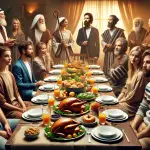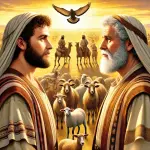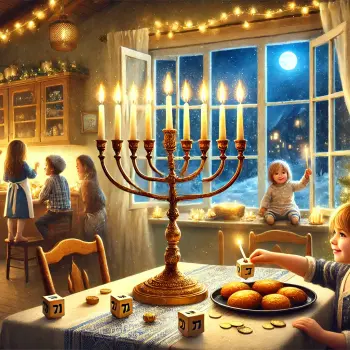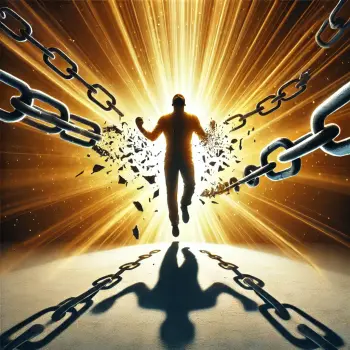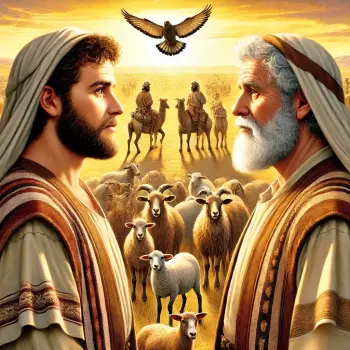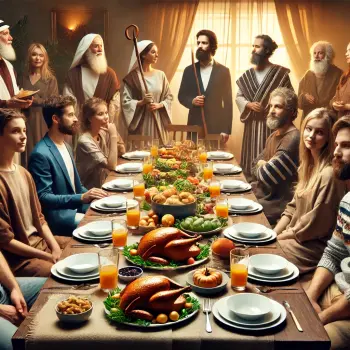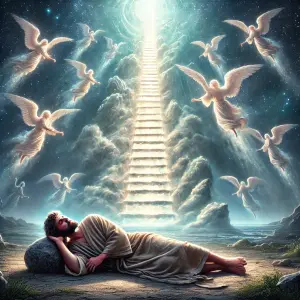
New beginnings are fraught with uncertainty and usually at least a little fear. Think back to anticipating the first day of school, unsure of who your teachers or classmates would be, made even worse in a new school. When you began a new job, were you certain you had everything you needed to succeed? When you lost a job and felt yourself staring into the abyss of unemployment, how frightened were you of not finding a new position or at least the right one?
Jacob, after stealing his father’s blessing from Esau is fleeing for his life, fearful that Esau will kill him. Traveling from what is today southern Israel, Beersheva, he is journeying toward Haran, near the Turkish-Syrian border. Jacob has never spent a night away from the safety of his camp. He is alone, in the wilderness, surrounded by the sounds of wild beasts, and likely torturted by whatever terrors his imagination can create. Night falls, he sets up camp, lays down and has a dream. In his dream, he sees a ladder ascending into the heavens. God appears beside him, introducing himself as Adonai, the God of Abraham, and the God of Isaac. God promises the land on which he is resting to him and his numerous descendants, through whom all the families of the earth will bless themselves. Furthermore, God promises to remain with him throughout Jacob’s journey to Haran and back and protect him throughout his travels.
Jacob’s Vow
Jacob awakens and acknowledges how amazing an experience this was, “Surely God is present in this place and I did not know it.” He has stumbled upon a holy site, perhaps by chance, perhaps by divine direction, and now he recognizes that this is some sort of conduit to the divine realm, a gateway to the heavens. He raises a pillar and consecrates the site with oil and then he makes what seems to me, a peculiar vow:
“If God remains with me, protecting me on this journey, that I am making, and giving me bread to eat and clothing to wear, and I return safe to my father’s house – Adonai shall be my God.” He then concludes the vow by saying the pillar he has erected will be God’s abode and he will set aside a tithe of everything God gives him for God.
Few of us have the experience of being directly addressed by God, even in a dream or vision . Most of us have made vows to God: if you help me pass this test that I haven’t studied for, I’ll be good for the rest of my life; if my child comes out of this emergency healthy, I’ll dedicate my life to you; or save me from this hurricane and I will give 25% of my savings to charity. We are apt to turn to God in times of crisis, seeking solace and reassurance. And if there is a positive outcome, we are grateful, even if that gratitude is short-lived.
Ultimatum?
Should we actually experience the immediacy of God’s presence, I think that sense of gratitude might extend for a longer period of time as the lingering experience of being touched by the divine permeates our consciousness and memory. Jacob, on the other hand, bargains. He seems to make his faith and trust dependent on God holding up the divine end of the bargain, an ancient from of ‘trust, but verify.’
Most traditional commentators are less than comfortable with a patriarch of the Jewish people issuing an ultimatum to God. Some explain the Hebrew word Im, if, can at times be better understood as when. In some contexts, that is correct. This doesn’t seem like one of those times.
Other commentators say the vow addresses if some misfortune were to happen to Jacob and he would be unable to fulfill his obligations, such as not finding a wife among his mother’s family. That also doesn’t seem to fit the context of this situation.
While Jacob is old enough to travel 600 miles to find a wife, emotionally, he is still a child, missing his mother and his home, not knowing if he will ever see either again. So, what does he do? He talks tough; he postures; he shows God and anyone within earshot how independent he is. All the while, he’s absolutely terrified of the journey ahead, even after God’s assurances.
Adolescent or Adult?
We all know people like Jacob at this stage of his life. Unsure of themselves, they bluster and bully, putting on a coat of bravado, and letting words fly toward anyone who might listen to or read them. How many grown adults have we seen calling out their “enemies” on social media and promising that they’ll get what they deserve? How many times have you finished a thread on social media and wondered if you were still in high school or at least if the posters still were? Have you ever just wanted to say, “grow up!” when youthful protestors assert their rights to receive basic humanitarian aid, such as bottled water, gluten-free products, and soy milk?
Contemporary society has delayed adolescence, seemingly into middle age in some cases. As a result, many like Jacob cling to adolescent comforts and delay the work of becoming their adult selves. Adulting isn’t about delivering ultimatums or talking tough. It is about accepting responsibility, letting actions speak louder than words, and making the difficult journey step by step.
As his story continues, Jacob experiences hardships; he learns; he grows; he reverts from time to time; but ultimately, he moves forward. He is far from perfect, but his life demonstrates what it means to grapple with the human condition and progress. May we learn to be careful with the words we utter, hold ourselves accountable, and appreciate life’s wonders as we continue in our journeys.


